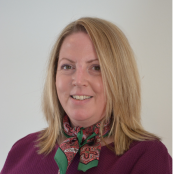Hannah is an interdisciplinary researcher, in the areas of digital health, age-friendly cities and communities, gerontology, digital ex/inclusion, health and wellbeing. She is a research fellow in the School of Health, Wellbeing and Social Care at The Open University, and has published widely for over ten years.
Her work is cited in national and international policy documents (e.g., House of Lords, ‘Beyond Digital: Planning for a Hybrid World’, 2021). Previously, she has held research positions in Germany at the German Sport University, Cologne, and at the David R. Cheriton School of Computer Science, University of Waterloo, Canada. Dr Marston is the lead investigator for the ‘Covid-19: Technology, Social connections, Loneliness and Leisure Activities’ international, multi-site project, and a Co-Investigator on the ‘Adapt Tech, Accessible Technology’ (ATAT) working alongside colleagues from Swansea University, Northumbria University.
Hannah holds a PhD (2010) in Virtual Reality and Gerontology from Teesside University, UK and as a research scientist in 2011 on the iStoppFalls EU project (2011 and 2014) included videogame design, ‘flow’ experience of participants, and tailored exergames incorporating strength and balance exercises as a prevention for future falls. Dr Marston has published over 50 peer-reviewed journal papers, book chapters, led and co-guest edited special issues and has presented her research at both national and international conferences.
In 2022 she led the publication ‘Transgenerational Technologies and Interactions for the 21st Century: Perspectives and Narratives’ which provides a 12-point manifesto for future applied research, and includes insights based on the Covid-19 experienced by people living in Northern Ireland, while industry, cross-and-interdisciplinary perspectives, and thoughts are set out for moving discourse forward.

